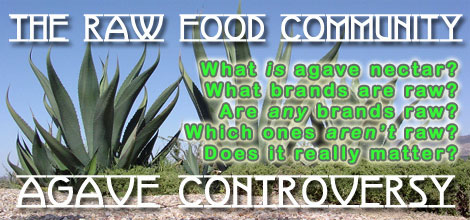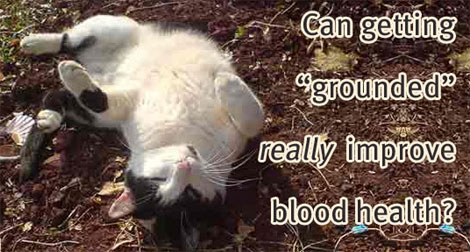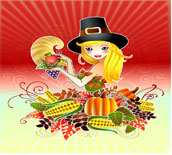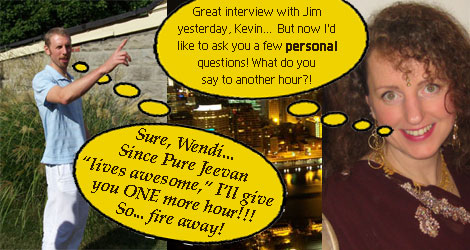I'm not sure I'm getting enough carbs 'cuz I eat very little grains or beans and I am always worried of overdoing fruit.
Well, rest assured that if you are consuming enough calories with your diet, and not exclusively eating fats and proteins, you are most likely getting enough carbohydrates. Carbohydrates exist in just about anything you can eat. By simply eating enough food during the day, you can easily meet your body's carbohydrate requirements.
There are two classifications of carbohydrates: simple and complex. Grains and beans fall under the complex category, while fruits fall under the simple category.
Read more: Am I Getting Enough Carbs Without Beans and Grains?

Bunny Berry is back with a new 100-day Raw Fu challenge! If you've made a New Year's resolution to eat more raw in 2009, Bunny Berry's Raw Fu community may offer you the amazing support you'll need to meet your goal for the new year. Check it out!? Here's a snippet from Raw Fu:
And we re BACK! It s time to ring in the New Year with a New 100 Day Challenge. Take the plunge with 100 days of support, love, and lots of leafy greens. Bunny will be back with daily videos, vision boards, special Raw Fu celebrity guest stars, Breakfast with Bunny calls, and more Cutting Board Cam!

Welcome to Pure Jeevan's "Juice-a-Day Jamboree"! You're probably wondering, "What IS Pure Jeevan's Juice-a-Day Jamboree, anyway "? Well, it's simple:? It's an ongoing, informal, loosely organized "event" centered around juicing. Think of it as an interim step between (1) any kind of diet or lifestyle, from SAD to full-on raw, that does not include much regular juice, and (2) an all out juice feast where that's ALL you'd consume for a period of time. Basically, we're saying, "Let's just make this simple and accessible for everyone. Let's just make a goal to simply drink more fresh juice!"
Wendi and I have been thinking a lot about incorporating more juicing into our lives lately (which is something we've done off and on over the years but never stuck with long-term). One thing holding us back from doing it more often is the time requirement. When we juice, it usually takes a half hour or so from start to finish. I know it doesn't seem that complicated, but I suppose it's just the whole process of setting up the juicer, washing and peeling the produce, juicing it, setting the juice aside while we clean the juicer, doling out the juice into glasses, cleaning up the mini-mess that makes, and then sitting down to actually enjoy the juice.

Last night I dreamed of meandering through an unfamiliar cityscape, following some lonely sidewalk next to a river at night, feeling particularly sad and miserable beneath dim yellow street lights. I wore a black suit, carried a highball glass, and was absolutely drunk!
Having crossed the river, I soon realized (even in my dream-drunken state) that I'd been wandering aimlessly. Feeling rather pathetic, I decided to walk back across the river and sober up in a casino that I knew was there. Drunk and depressed, I figured I'd just sit in front of a slot machine for a few hours.

Q: How Long Do Smoothies Last?
I responded to a similar question a while ago in an online forum. This issue comes up a lot, acually, so I figured I'd provide our response here on the blog rather than simply through an email reply. Here's that response, reworked a bit for our blog:
Optimally, I suppose we'd all just eat things whole, most of the time, instead of blending/juicing ...

Within the raw food community, a controversy seems to have been brewing for the better part of a year! The topic: Agave nectar (also called agave syrup). Surely by now most people know what agave nectar is. For anyone who doesn't, it's a thick liquid sweetener made from, you guessed it, the agave plant.
In general, the production of tasty agave nectar involves heating the plant to a certain temperature (which varies widely according to which manufacturer is making it and which species of agave is used). The extent of this heating constitutes a significant part of the controversy (as most raw foodists believe that heating any food over a certain temperature, usually somewhere between 105 and 118 degrees fahrenheit, renders it "dead").
Read more: Pure Jeevan Explores the Raw Food Community's Agave Nectar Controversy

Jim here... A week or two ago, there were some videos floating around in raw food circles that seemed to indicate that one's blood health (and, by extension, one's overall health) can be quickly and dramatically improved through a practice known as grounding. I realize that, metaphorically, people commonly use the term "grounded" to indicate a kind of level-headedness -- e.g., a "down to earth" attitude. But, in the literal sense, it's an electrical term used to describe a physical connection to the earth. I'm no engineer, but my understanding is that these connections basically discharge things or people from any static electricity build-up (as in those bracelets that computer repair techs wear), or serve as a conduit through which other electricity may pass (as in lightning rods).
 That the idea of "grounding oneself" should take root so strongly in natural health circles is unsurprising. In theory, it seems to make a lot of sense. I'm just as intrigued by it as the next person, I suppose. If we spend most of our lives wearing rubber-souled shoes, walking on shag-carpeting, sitting suspended off the ground on static-filled things like couches and office chairs, often running various electrical equipment, basking in EMFs from radio waves and Dish-network signals and cell phone radiation... sure, it makes sense that we're probably all experiencing some heretofore unprecedented (evolutionarily speaking) human body exposure to significant electrical phenomena. My car reminds me of this daily with a (friggin' annoying!) shock each time I get out and close the door. But, as the "double-rainbow guy" so succinctly put it: ?What does it mean
That the idea of "grounding oneself" should take root so strongly in natural health circles is unsurprising. In theory, it seems to make a lot of sense. I'm just as intrigued by it as the next person, I suppose. If we spend most of our lives wearing rubber-souled shoes, walking on shag-carpeting, sitting suspended off the ground on static-filled things like couches and office chairs, often running various electrical equipment, basking in EMFs from radio waves and Dish-network signals and cell phone radiation... sure, it makes sense that we're probably all experiencing some heretofore unprecedented (evolutionarily speaking) human body exposure to significant electrical phenomena. My car reminds me of this daily with a (friggin' annoying!) shock each time I get out and close the door. But, as the "double-rainbow guy" so succinctly put it: ?What does it mean

For some odd reason, I've had the privilege of "doing Thanksgiving" with a lot of different friends and families over the years. Because of this, and of course just from talking with others and reading things others have posted, I'm fairly certain that Thanksgiving means different things to different people.For some, it's their favorite annual holiday and fills them with joyous memories of Thanksgivings past and incredible anticipation of Thanksgivings to come. Some historian friends of mine seem fascinated by the historical aspects of the holiday -- the whole story of the pilgrims, etc. On the other end of the spectrum, I've actually encountered a few people who take offense at the very idea of this holiday (and they've got some convincing reasons to protest the wider celebrations)!
 While all holidays are certainly "food-centric" by tradition, it's arguable that no other holiday (at least here in America) can match Thanksgiving's reputation in terms of feasting. It's kind of funny when you think about it because many holidays (or, "holy days") are actually traditionally observed by abstaining from food. So, there are fasts, and feasts. I think the majority view, based on my own sampling of various friend and family traditions, seems to be: It's mostly about having a huge meal. Yes, there is certainly an undercurrent of being thankful out there. A few families I've been with have had traditional, almost ceremonial, activities that went along with the meal (e.g., going around the room, taking turns stating what you're grateful for).
While all holidays are certainly "food-centric" by tradition, it's arguable that no other holiday (at least here in America) can match Thanksgiving's reputation in terms of feasting. It's kind of funny when you think about it because many holidays (or, "holy days") are actually traditionally observed by abstaining from food. So, there are fasts, and feasts. I think the majority view, based on my own sampling of various friend and family traditions, seems to be: It's mostly about having a huge meal. Yes, there is certainly an undercurrent of being thankful out there. A few families I've been with have had traditional, almost ceremonial, activities that went along with the meal (e.g., going around the room, taking turns stating what you're grateful for).
Before we moved to Portland, Oregon, land of all things fresh and organic within walking distance, we had to drive quite a distance to reach the food co-op (the only place that had a good selection of organic produce and other raw food necessities). So, we only went shopping about once a week. It took a lot of trial and error to find ways to keep our weekly produce fresh for about a week.
We learned which fruits and vegetables stay fresh the longest, and which go bad the fastest. Based on this, we stocked the refrigerator accordingly (and used up the produce accordingly, as well). The fruits and veggies that stayed fresh the longest were stored in the backs of the shelves (things like carrots, beets, broccoli, cauliflower, apples, etc.). Next we stored the greens that lasted a pretty good amount of time (like kale and collards). And in the front of the shelves and in the door, we stored the more delicate greens (like lettuces and herbs).

So, did you like Part One yesterday ? Pretty great, right ? Well, today we present Part Two, in which Wendi takes the interview into a more up-close and personal place. In this audio, Kevin shares details about:
-
the first interview he ever conducted
-
what he wanted to be when he grew up
-
what his family thinks of his raw lifestyle
-
his tattoo, Joseph Campbell, and thoughts on life and death
-
spirituality, religion, and guilt
-
the book that opened his mind to a deeper connection
-
running and spirituality
-
his typical day / routine
-
his business expanding
-
what "systems" are and how he uses them
-
the shocking truth about his teen years
-
recent personal development programs he's listening to
-
"taking 1%, applying it, and moving on"
-
mentors and influences
-
the books that shaped his life
-
making shifts in friendships
-
his thoughts on "The Secret"
-
whether he thinks he can do more push-ups than Gabriel Cousens
-
why there was a donkey at his wedding
-
his biggest wish (it's a beautiful one!)
So, what are you waiting for ? Listen NOW!!
Read more: Part *2* of a 3-Part Series Profiling the Multi-Talented Kevin Gianni!
 Wendi's initial observation about Santa Rosa was that, at first glance, it seemed similar to many of the places they'd visited in Oregon. However, once the sun came out, she said you could feel that California sunshine starting to warm up your body. This is Northern CA, so it's not overly hot; it is, however, much sunnier and a bit warmer than the parts of Oregon they visited.
Wendi's initial observation about Santa Rosa was that, at first glance, it seemed similar to many of the places they'd visited in Oregon. However, once the sun came out, she said you could feel that California sunshine starting to warm up your body. This is Northern CA, so it's not overly hot; it is, however, much sunnier and a bit warmer than the parts of Oregon they visited.
Wendi and KDcat were hosted by a lovely couple, Shea Lynn Baird and Stephen Barlow (and their adorable dog, Bella, pictured above). You might be familiarwith Shea already, as she and her husband launched the popular Monday Night Live series, broadcast Monday nights from Cafe Gratitude. Shea is a long-term raw foodist, so Wendi interviewed her and asked some questions about what she's been doing. It's a really great, highly interesting interview. Wendi also asked Shea to offer some helpful advice for our Pure Jeevan family members. I think everyone will enjoy the video:
Read more: Santa Rosa with Shea Lynn Baird, Stephen Barlow, and Bella -- And More!


